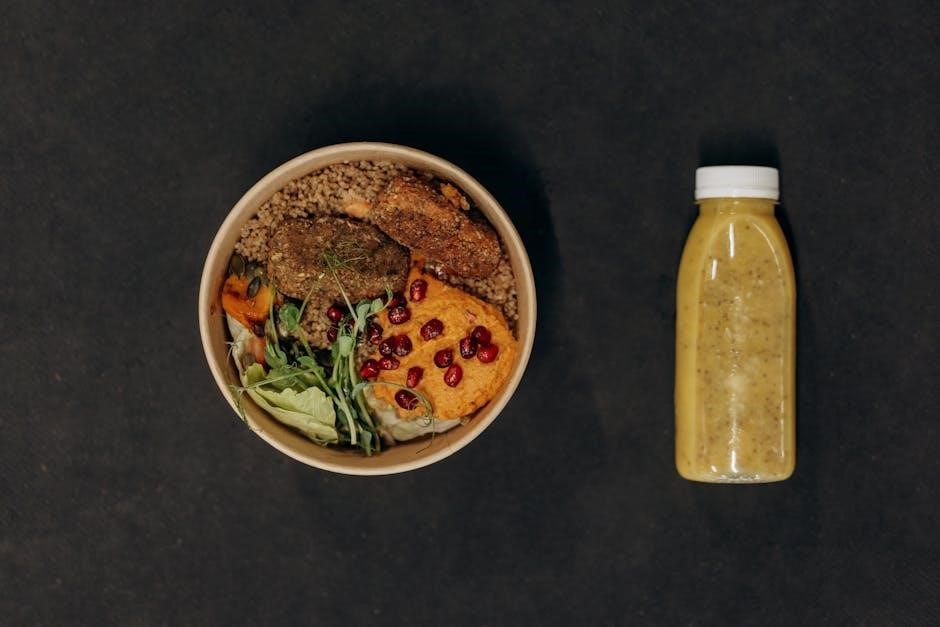
Title
1.1 1400 Calorie Meal Plan PDF: A Comprehensive Guide
Discover a structured 1400-calorie meal plan designed for weight loss and balanced nutrition‚ offering delicious recipes and a free downloadable PDF for easy tracking and planning.
This 1400-calorie meal plan PDF provides a detailed‚ easy-to-follow guide for weight loss and balanced nutrition. It includes a 7-day schedule with high-protein recipes‚ low-fat options‚ and nutrient-dense meals. Perfect for those aiming to shed pounds or improve overall health‚ this plan offers a variety of delicious dishes‚ portion control tips‚ and a free downloadable format for convenience. Whether you prefer vegetarian‚ keto‚ or plant-based diets‚ this guide ensures a structured approach to achieving your fitness goals with macro breakdowns and printable meal schedules.
A 1400-calorie meal plan is a structured guide for weight loss and overall health‚ offering balanced nutrition and a downloadable PDF for easy meal planning and tracking.
2.1 Overview of the 1400 Calorie Meal Plan
A 1400-calorie meal plan is a comprehensive guide designed to support weight loss and overall health. It includes structured breakfast‚ lunch‚ dinner‚ and snack options‚ ensuring balanced nutrition. The plan emphasizes portion control‚ nutrient-dense foods‚ and variety to keep meals interesting. Suitable for individuals with moderate activity levels‚ it promotes sustainable weight management. A downloadable PDF version is often available‚ making it easy to follow and track progress. This plan is flexible and can be tailored to suit different dietary preferences and lifestyles.
2.2 Importance of a Balanced Diet
A balanced diet is essential for maintaining overall health and ensuring the body receives adequate nutrients. It provides the necessary proteins‚ carbohydrates‚ fats‚ vitamins‚ and minerals to support energy levels and bodily functions. A balanced diet helps prevent nutrient deficiencies‚ promotes weight management‚ and reduces the risk of chronic diseases. By incorporating a variety of whole foods‚ individuals can maintain a healthy lifestyle while achieving their weight loss goals. A structured meal plan‚ like the 1400-calorie plan‚ ensures nutritional balance without excessive calories or unhealthy fats.
2.3 Benefits of a 1400 Calorie Diet
A 1400-calorie diet promotes steady weight loss‚ particularly for women and those with lower activity levels. It helps create a calorie deficit needed for fat reduction while providing enough energy for daily functions. This plan often improves blood sugar control and enhances heart health by limiting unhealthy fats. Additionally‚ it encourages mindful eating and portion control‚ promoting long-term healthy habits that support overall wellness without extreme deprivation;

Breakfast Options
Start your day with nutrient-rich breakfasts‚ including high-protein recipes like Greek yogurt‚ low-fat options such as oatmeal‚ and balanced meals that kickstart metabolism and energy levels.
3.1 High-Protein Breakfast Recipes
Jumpstart your day with these delicious and nutrient-dense high-protein breakfast recipes. Options include Greek yogurt parfaits‚ egg whites with spinach‚ and avocado toast. These meals are designed to keep you full while staying within your calorie goals. Each recipe is carefully balanced to provide sustained energy and support weight loss efforts without sacrificing flavor. Perfect for those looking to maintain muscle mass while following a 1400-calorie diet.
3.2 Low-Fat Breakfast Ideas
Start your morning with these low-fat breakfast ideas that are both healthy and flavorful. Try non-fat Greek yogurt with fresh berries or a smoothie made with skim milk and fruit. Scrambled egg whites with vegetables like spinach and tomatoes are another excellent option. Oatmeal with a drizzle of honey and a sprinkle of chia seeds is also a hearty choice. These recipes are designed to be low in fat while providing essential nutrients to kickstart your day on a 1400-calorie meal plan.
3.3 Nutrient-Dense Breakfast Choices
Begin your day with nutrient-dense breakfast options that fuel your body without excess calories. Oatmeal topped with fresh berries and chia seeds provides fiber and antioxidants. Avocado toast on whole-grain bread offers healthy fats and vitamins. Egg whites scrambled with spinach and mushrooms deliver lean protein and vitamins. A smoothie blending spinach‚ banana‚ and almond milk is packed with nutrients. These choices ensure a balanced start‚ aligning perfectly with your 1400-calorie meal plan goals while satisfying your appetite and nutritional needs.

Snack Options
Explore a variety of healthy‚ low-calorie snacks that keep you satisfied without exceeding your daily limit. Fresh fruits‚ nuts‚ and protein-rich options like yogurt or hard-boiled eggs are ideal choices.
4.1 Healthy Snacking Tips
Healthy snacking is essential for maintaining energy levels and preventing overeating. Opt for nutrient-dense options like fruits‚ vegetables‚ nuts‚ and protein-rich snacks. Portion control is key to staying within your calorie limit. Avoid processed foods and sugary treats‚ as they provide empty calories. Incorporate snacks that combine protein and fiber to keep you satisfied. Examples include Greek yogurt‚ hard-boiled eggs‚ or a handful of mixed nuts. Staying hydrated can also curb unnecessary snacking. Plan your snacks in advance to ensure they align with your dietary goals.
4.2 Low-Calorie Snack Ideas
Low-calorie snacks are perfect for curbing hunger without exceeding your daily limit. Opt for options like non-fat Greek yogurt‚ baby carrots‚ or fresh berries. A small handful of mixed nuts or air-popped popcorn can also satisfy cravings. Hard-boiled eggs‚ cucumber slices with hummus‚ or a single slice of whole-grain toast with avocado are excellent choices. These snacks provide essential nutrients while keeping calories in check‚ ensuring you stay on track with your 1400-calorie meal plan. Incorporate variety to maintain interest and avoid boredom.
4.3 Protein-Rich Snacks
Protein-rich snacks are an excellent way to keep you full and support muscle maintenance. Opt for non-fat Greek yogurt with berries‚ hard-boiled eggs‚ or a small serving of cottage cheese. A handful of mixed nuts or a protein smoothie with whey powder and low-fat milk are also great options. These snacks not only provide essential amino acids but also help stabilize blood sugar levels‚ making them ideal for a 1400-calorie meal plan. Incorporating protein-rich snacks can boost metabolism and keep cravings at bay throughout the day.

Lunch Options
A balanced 400-calorie lunch includes grilled chicken or tofu‚ mixed vegetables‚ and quinoa. This supports weight loss while providing essential nutrients for overall health.
5.1 Balanced Lunch Recipes
Enjoy nutritious and flavorful lunches with recipes like grilled chicken salad‚ quinoa bowls‚ or whole-grain wraps. Each meal is designed to provide balanced macronutrients‚ staying within your daily calorie goals. For example‚ a salad with 4 oz of grilled chicken‚ mixed greens‚ cherry tomatoes‚ and a light vinaigrette totals around 350 calories. Pair it with a side of steamed vegetables for added fiber and satisfaction. These recipes ensure you stay energized and focused throughout the afternoon while supporting your weight loss journey.
5.2 Vegetarian Lunch Ideas
Explore delicious vegetarian options like chickpea and spinach stew‚ lentil salad‚ or grilled vegetable wraps. A hearty chickpea salad with mixed greens‚ cucumber‚ and a lemon-tahini dressing offers about 400 calories. Alternatively‚ a whole-grain pita stuffed with roasted vegetables and hummus provides balanced protein and fiber. These meals are nutrient-rich‚ satisfying‚ and align perfectly with your 1400-calorie goal‚ ensuring you stay energized and committed to your health journey.
5.3 Portion Control Tips
Mastering portion control is key to staying within your 1400-calorie limit. Use smaller plates to visually satisfy hunger and measure ingredients to avoid over-serving. Plan meals with balanced macronutrients‚ ensuring protein‚ fiber‚ and healthy fats are included. Track snacks by portioning them into individual containers. Eat mindfully‚ savoring each bite‚ and stop when satisfied‚ not full. This approach helps maintain calorie goals while keeping meals satisfying and nutritious‚ supporting long-term weight management and overall health.

Dinner Options
Explore nutritious dinner recipes designed for a 1400-calorie diet‚ featuring lean proteins‚ fiber-rich vegetables‚ and balanced flavors. Perfect for a satisfying evening meal.
6.1 Nutritious Dinner Recipes
Indulge in wholesome dinner options tailored for a 1400-calorie diet. Recipes include baked eggs in tomato sauce with kale‚ chickpea and spinach stew‚ and roasted fish tacos. These meals are rich in lean proteins‚ fiber‚ and essential nutrients. Each dish is carefully portioned to maintain calorie balance while offering satisfying flavors. Incorporate healthy fats like avocado and olive oil for added nutrition. Pair with steamed vegetables or quinoa for a well-rounded meal. Perfect for weight loss and overall wellness‚ these recipes ensure you stay nourished and satisfied through the evening.
6.2 Low-Fat Dinner Ideas
Opt for delicious low-fat dinner options that align with your 1400-calorie goals. Try grilled chicken breast with roasted vegetables‚ baked fish with lemon‚ or vegetable stir-fries with lean tofu. Incorporate non-starchy vegetables like spinach‚ broccoli‚ and bell peppers to enhance flavor without excess calories. Use herbs and spices for seasoning to avoid added fats. Pair meals with a side of quinoa or brown rice for fiber. These recipes ensure satisfaction while maintaining a low-fat profile‚ perfect for weight loss and heart health.
6.3 Meal Prepping Tips
Meal prepping is a great way to stay on track with your 1400-calorie diet. Plan your meals for the week‚ portion out ingredients‚ and store them in airtight containers. Consider batch-cooking proteins like grilled chicken or fish and freezing them for later use. Chop vegetables in advance for quick salads or stir-fries. Use a variety of seasonings to keep meals flavorful without adding extra fat or calories. Prepping ensures healthy‚ balanced dinners and saves time during busy weekdays‚ helping you maintain consistency with your meal plan.

Dessert Options
Indulge in low-calorie desserts like sugar-free recipes or fruit-based treats‚ offering a sweet finish to meals while keeping calorie intake in check for your diet plan.
7.1 Low-Calorie Dessert Ideas
Enjoy guilt-free desserts with these low-calorie options! Try fruit parfaits with Greek yogurt‚ sugar-free cheesecake‚ or dark chocolate squares. These desserts satisfy cravings while keeping calories low. Incorporate natural sweeteners like stevia or monk fruit to reduce sugar content. Portion control is key‚ ensuring treats stay within your daily calorie goals. These ideas allow you to indulge without derailing your weight loss journey‚ making them perfect for a balanced 1400-calorie meal plan.
7.2 Sugar-Free Dessert Recipes
Indulge in sugar-free desserts that satisfy cravings without guilt! Try recipes like chocolate mousse made with cocoa powder and stevia‚ or fruit parfaits layered with non-fat yogurt. Sugar-free cheesecake with a nut-based crust is another delightful option. These desserts use natural sweeteners like monk fruit or erythritol‚ ensuring minimal calorie impact. Perfect for a 1400-calorie meal plan‚ they offer a sweet treat while maintaining dietary goals. Enjoy desserts that are both nutritious and flavorful‚ keeping your sugar intake in check.
7.3 Healthy Dessert Alternatives
Enjoy guilt-free desserts with these healthy alternatives! Opt for fruit parfaits with non-fat yogurt‚ dark chocolate squares‚ or sorbet made from fresh berries. These options are low in calories and rich in nutrients. Incorporate natural sweeteners like stevia or monk fruit to satisfy your sweet tooth. Pairing fruit with a dollop of Greek yogurt adds protein without excess sugar. These desserts align perfectly with a 1400-calorie meal plan‚ ensuring you stay on track while indulging in something sweet and satisfying.

Benefits of a 1400 Calorie Diet
A 1400-calorie diet promotes sustainable weight loss‚ enhances heart health‚ and supports balanced nutrition‚ helping you achieve your fitness goals effectively while maintaining overall well-being.
8.1 Weight Loss
The 1400-calorie meal plan is an effective strategy for weight loss‚ particularly for women‚ promoting a deficit that leads to 2-4 pounds lost monthly. By maintaining this intake‚ individuals can sustainably shed pounds without extreme restrictions‚ making it easier to stick with long-term. This calorie level balances nutrition with reduction‚ ensuring energy levels remain stable while the body burns fat efficiently for a slimmer‚ healthier physique over time.
8.2 Improved Blood Sugar Control
A 1400-calorie meal plan can help regulate blood sugar levels by balancing macronutrients and emphasizing whole‚ unprocessed foods. By focusing on lean proteins‚ healthy fats‚ and complex carbohydrates‚ the diet reduces spikes in blood glucose. This approach‚ combined with portion control‚ enhances insulin sensitivity and stabilizes energy levels throughout the day‚ making it beneficial for those managing or preventing type 2 diabetes. The structured meals also curb cravings for sugary or refined foods‚ promoting long-term blood sugar balance and overall metabolic health.
8.3 Enhanced Heart Health
A 1400-calorie meal plan supports cardiovascular well-being by reducing excess weight‚ lowering blood pressure‚ and minimizing harmful cholesterol levels. The diet emphasizes heart-healthy foods like whole grains‚ lean proteins‚ and a variety of colorful fruits and vegetables. By limiting saturated fats and incorporating healthy fats‚ such as those from avocados and nuts‚ the plan helps maintain optimal lipid profiles. Additionally‚ the focus on fiber-rich foods aids in reducing inflammation and improving overall heart health‚ lowering the risk of cardiovascular diseases and promoting long-term well-being.

Considerations
A 1400-calorie meal plan requires adjusting intake based on activity levels‚ ensuring balanced macronutrients‚ and monitoring for potential nutrient deficiencies to maintain optimal health and prevent deficiencies.
9.1 Caloric Needs and Activity Levels
Your daily caloric needs vary based on activity levels. Sedentary individuals may thrive on 1‚400 calories‚ while moderately or highly active people might require adjustments. A woman on this plan can expect a 2-4 pound monthly weight loss‚ while men may lose 4-6 pounds. Ensure your activity level aligns with your caloric intake for optimal results. If you’re highly active‚ you may need to increase your calorie consumption slightly to avoid nutrient deficiencies and maintain energy levels. Always consult a professional for personalized adjustments.
9.2 Macronutrient Balance
A 1400-calorie meal plan should maintain a balanced mix of macronutrients: 45-55% carbohydrates‚ 30-35% protein‚ and 20-25% fats. This ensures sustained energy‚ muscle preservation‚ and overall health. Prioritize whole‚ unprocessed foods to meet these targets‚ avoiding excessive sugar or unhealthy fats. Adjusting macronutrient ratios can optimize results based on individual goals‚ such as higher protein for muscle retention or lower carbs for ketosis. Balancing these elements supports both weight loss and nutritional adequacy‚ making the plan sustainable and effective for long-term health.
9.3 Potential Nutrient Deficiencies
A 1400-calorie meal plan may risk nutrient deficiencies if not well-planned. Key areas of concern include insufficient iron‚ calcium‚ and B vitamins due to reduced food variety. Low-calorie diets can sometimes lack essential micronutrients‚ especially if food choices are limited. Incorporating fortified foods‚ lean proteins‚ and a variety of colorful vegetables helps mitigate these risks. Regularly assessing and adjusting the meal plan ensures adequate nutrient intake‚ preventing long-term health issues and supporting overall well-being.

Customizing the Meal Plan
Tailor the 1400-calorie plan to suit your preferences‚ adjusting macronutrient ratios‚ and swapping ingredients. Ensure variety and adjust portions based on progress and dietary needs.
10.1 Adjusting for Individual Needs
Tailor the 1400-calorie meal plan to fit personal preferences and health goals. Adjust portion sizes‚ macronutrient ratios‚ and ingredient choices based on activity levels‚ dietary restrictions‚ and progress. For example‚ increase protein intake for muscle maintenance or reduce carbs for ketosis. Swap ingredients to accommodate food allergies or cultural preferences. Regularly monitor weight loss and adjust calorie intake as needed to ensure steady progress without nutrient deficiencies. This flexibility ensures the plan remains sustainable and effective for long-term success.
10.2 Incorporating Cultural Preferences
Adapt the 1400-calorie meal plan to suit cultural tastes by substituting ingredients and recipes. For instance‚ include traditional dishes like Indian dal or Mexican salads‚ ensuring they align with calorie goals; Swap staples like rice for quinoa or brown rice to enhance nutrition. Incorporate flavors and spices from global cuisines while maintaining portion control. This cultural integration keeps meals exciting and tailored to personal preferences‚ promoting long-term adherence to the diet plan.
10.3 Managing Food Allergies
Accommodate food allergies by substituting ingredients in the 1400-calorie meal plan. Replace nuts with seeds‚ dairy with almond milk‚ or gluten with rice flour. Ensure all alternatives align with calorie and nutritional goals. Always read food labels to avoid allergens and cross-contamination. For severe allergies‚ consult a nutritionist to tailor the plan safely. This approach ensures the diet remains effective while addressing specific dietary needs and preferences. Personalization is key to maintaining safety and adherence to the meal plan.

Tracking Progress
Monitor your journey with a food diary‚ recording meals and calories. Regularly weigh yourself and adjust the plan as needed to stay on track and achieve goals.
11.1 Food Diaries
Keeping a food diary is a powerful tool for tracking progress. List the food amounts‚ calories‚ and sodium for everything you eat and drink daily. This helps identify patterns‚ ensure adherence to the 1400-calorie plan‚ and make necessary adjustments. Use a notebook or an app to log meals‚ snacks‚ and portion sizes. Regularly reviewing your diary can boost accountability and motivation‚ helping you stay committed to your weight loss goals and maintain a balanced diet. Consistency is key to achieving success with your meal plan. Additionally‚ tracking sodium intake helps promote heart health and overall well-being‚ aligning with the plan’s focus on nutritious eating habits. By monitoring your daily intake‚ you can make informed decisions and celebrate small victories along your journey. This practice not only aids in weight management but also fosters a healthier relationship with food‚ ensuring long-term benefits beyond the diet phase. The diary becomes a personalized guide‚ reflecting your progress and helping you refine your approach as needed. Over time‚ this habit can lead to sustainable lifestyle changes‚ making the 1400-calorie meal plan a stepping stone to a healthier‚ more balanced life. The combination of awareness and accountability through food diaries significantly enhances the effectiveness of the meal plan‚ making it easier to reach and maintain your desired weight. Moreover‚ it allows for flexibility‚ enabling you to incorporate new recipes and adjust portion sizes based on your evolving needs and preferences. The insights gained from your diary will empower you to make better choices‚ ensuring that your dietary habits support both your immediate goals and long-term health objectives. Ultimately‚ the food diary serves as a vital companion on your journey to a healthier‚ more vibrant you. By diligently tracking your meals‚ you’ll be able to celebrate milestones‚ learn from setbacks‚ and continually improve your approach to nutrition. This dedication to monitoring your intake will not only help you succeed with the 1400-calorie plan but also set the foundation for a lifetime of mindful‚ nourishing eating. The food diary is more than just a tool; it’s a catalyst for transformation‚ helping you unlock the full potential of your meal plan and achieve the results you desire. With each entry‚ you’re one step closer to your goals‚ making the effort well worth the time and attention. The benefits of maintaining a food diary extend far beyond the duration of the diet‚ contributing to a lasting commitment to health and wellness. It’s an essential practice that complements the structured approach of the 1400-calorie meal plan‚ ensuring that you maximize its effectiveness and enjoy the rewards of your hard work. Through consistent tracking and reflection‚ you’ll gain valuable insights into your eating habits‚ enabling you to make positive changes that enhance your overall quality of life. The food diary is a simple yet potent strategy that plays a crucial role in the success of your weight loss journey‚ offering both practical guidance and personal encouragement every step of the way. By embracing this habit‚ you’ll not only achieve your weight loss goals but also cultivate a deeper understanding of your nutritional needs and preferences‚ leading to a more balanced and satisfying relationship with food. The food diary is an indispensable resource that supports your progress‚ helping you navigate the challenges of the 1400-calorie meal plan with confidence and determination. With each passing day‚ your diary will serve as a testament to your commitment and a source of inspiration‚ reminding you of the strides you’ve made and the goals you’re yet to achieve. The act of recording your meals becomes a ritual of accountability‚ reinforcing your dedication to a healthier lifestyle. As you fill the pages with your daily choices‚ you’ll find strength in the process‚ knowing that every entry brings you closer to realizing your vision of a slimmer‚ healthier self. The food diary is more than just a log of meals; it’s a chronicle of your transformation‚ a story of perseverance and growth that underscores the importance of mindful eating. By maintaining this practice‚ you’ll not only master the 1400-calorie meal plan but also develop the skills and awareness needed to sustain a healthy diet for years to come. The food diary is a powerful ally in your quest for weight loss‚ offering the structure and insight necessary to overcome obstacles and achieve lasting success. With each entry‚ you’re building a foundation of healthier habits that will serve you well beyond the initial phases of your journey. The diary’s role in tracking your progress is invaluable‚ providing a clear roadmap of your achievements and areas for improvement. It’s a personalized guide that evolves with you‚ adapting to your changing needs and helping you stay focused on your objectives. Through the consistent use of a food diary‚ you’ll be able to celebrate your successes‚ learn from your challenges‚ and continually refine your approach to nutrition. This ongoing process of reflection and adjustment is key to maximizing the effectiveness of the 1400-calorie meal plan and ensuring that your efforts yield the desired results. The food diary is an essential component of your weight loss strategy‚ offering the tools and motivation needed to stay on track and achieve your goals. By dedicating time each day to record your meals and snacks‚ you’ll cultivate a heightened awareness of your eating habits and make more informed decisions about your diet. This increased mindfulness not only supports your immediate weight loss objectives but also contributes to a more balanced and nutritious lifestyle in the long term. The food diary serves as a constant reminder of your commitment to health‚ encouraging you to stay disciplined and focused‚ even when faced with temptation or setbacks. It’s a trusted companion that provides both accountability and encouragement‚ helping you navigate the ups and downs of your weight loss journey with confidence and resilience. By maintaining a food diary‚ you’ll be better equipped to handle challenges‚ celebrate milestones‚ and sustain the momentum needed to reach your goals. The diary’s impact extends beyond the realm of tracking; it’s a catalyst for positive change‚ empowering you to take control of your health and well-being. Through the insights gained from your diary‚ you’ll be able to identify areas for improvement and implement strategies that enhance the effectiveness of your meal plan. This iterative process of tracking‚ reflecting‚ and adjusting ensures that you’re always moving closer to your desired outcomes‚ making the effort of maintaining a food diary a worthwhile investment in your health. The food diary is a simple yet effective tool that plays a pivotal role in the success of the 1400-calorie meal plan‚ offering a comprehensive approach to tracking and managing your dietary habits. By integrating this practice into your daily routine‚ you’ll be able to monitor your progress‚ identify patterns‚ and make informed decisions that align with your weight loss goals. The diary’s ability to provide a clear and detailed record of your meals and snacks makes it an invaluable resource for staying on track and achieving the results you desire. With each entry‚ you’re not only documenting your journey but also reinforcing your commitment to a healthier lifestyle‚ creating a powerful synergy that drives you toward success. The food diary is more than just a practical tool; it’s a symbol of your dedication to transforming your health and well-being. By embracing this practice‚ you’ll be empowered to take charge of your nutrition‚ overcome obstacles‚ and realize the full potential of the 1400-calorie meal plan. The insights and accountability provided by your diary will serve as a foundation for lasting change‚ enabling you to maintain a healthy diet and enjoy the many benefits that come with it. Through consistent tracking and reflection‚ you’ll unlock the secrets to successful weight loss and develop the habits necessary for a lifetime of balanced eating. The food diary is a cornerstone of your weight loss journey‚ offering the structure‚ motivation‚ and insight needed to achieve your goals and sustain a healthier lifestyle. By committing to this practice‚ you’ll be well on your way to realizing the transformative power of the 1400-calorie meal plan and embracing a brighter‚ healthier future; The food diary is your key to unlocking the full potential of your weight loss efforts‚ providing the tools and encouragement necessary to succeed and thrive on your journey to a slimmer‚ more vibrant you.
11.2 Weight Monitoring
Regular weight monitoring is essential to track progress on the 1400-calorie meal plan. Weigh yourself weekly to observe changes‚ ensuring you’re meeting your goals. This practice helps maintain accountability and motivation. By monitoring weight‚ you can adjust calorie intake or activity levels as needed. Consistency is key to achieving a steady weight loss of 2-4 pounds per month for women and 4-6 pounds for men. Use a reliable scale and track trends over time to stay motivated and make informed decisions about your diet and exercise routine.
11.4 Adjusting the Plan as Needed
Regularly assess your progress on the 1400-calorie meal plan and make adjustments as necessary. If weight loss stalls‚ consider reducing calorie intake slightly or increasing physical activity. Ensure balanced nutrition by maintaining proper portions of proteins‚ fats‚ and carbohydrates. Stay hydrated to avoid mistaking thirst for hunger. Incorporate nutrient-dense foods like fruits‚ vegetables‚ lean proteins‚ and whole grains for satisfaction and essential vitamins. Explore recipe alternatives to keep meals enjoyable and sustainable. Be patient‚ as progress varies‚ and consider consulting a nutritionist for personalized advice if needed. Adapt the plan flexibly to suit lifestyle changes and maintain long-term effectiveness.
The 1400-calorie meal plan offers a balanced approach to weight loss and improved nutrition‚ providing sustainable results with customizable options to suit diverse dietary preferences and goals effectively.
12.1 Final Thoughts
The 1400-calorie meal plan is a well-rounded approach to achieving weight loss and improving overall health. With its emphasis on balanced nutrition and delicious recipes‚ this plan is both sustainable and satisfying. The availability of a free downloadable PDF makes it easy to track progress and stay committed. By following this structured plan‚ individuals can expect steady weight loss and enhanced well-being. Consistency is key‚ and the customizable options ensure that the plan can be tailored to suit various dietary preferences and goals‚ making it an ideal choice for those seeking a healthy lifestyle. Stay consistent and enjoy the journey to a healthier you!
12.2 Encouragement for Consistency
Staying consistent with the 1400-calorie meal plan is key to achieving your goals. Celebrate small victories‚ like preparing healthy meals or resisting unhealthy cravings‚ to stay motivated. Remember‚ consistency leads to sustainable results. The plan is designed to be flexible‚ allowing you to adapt it to your preferences while maintaining a balanced diet. Don’t be too hard on yourself if you slip up—simply get back on track. Every healthy choice brings you closer to your goals‚ and the downloadable PDF makes it easier to stick to the plan. Keep going‚ and you’ll see the positive changes in your health and energy levels over time!
 the house across the lake pdf
the house across the lake pdf  heard on the wall street pdf
heard on the wall street pdf  locating the epicenter of an earthquake worksheet pdf answer key
locating the epicenter of an earthquake worksheet pdf answer key  sie exam study guide pdf
sie exam study guide pdf  48 laws of power summary pdf
48 laws of power summary pdf  citi program quiz answers pdf
citi program quiz answers pdf  mitsubishi d700 instruction manual
mitsubishi d700 instruction manual  indesit washing machine manual iwdc6125
indesit washing machine manual iwdc6125